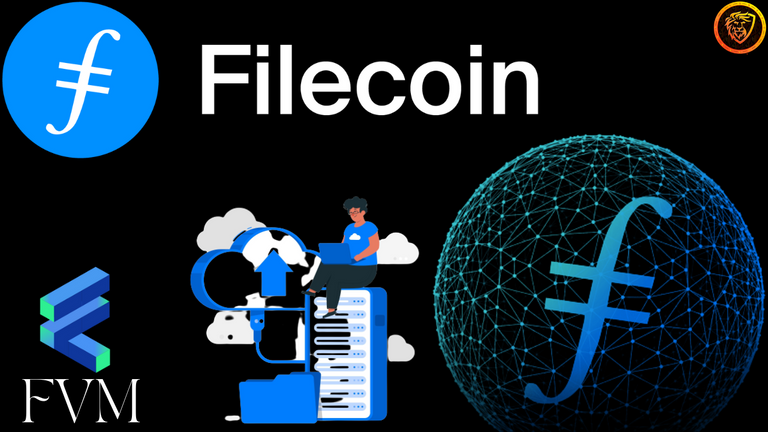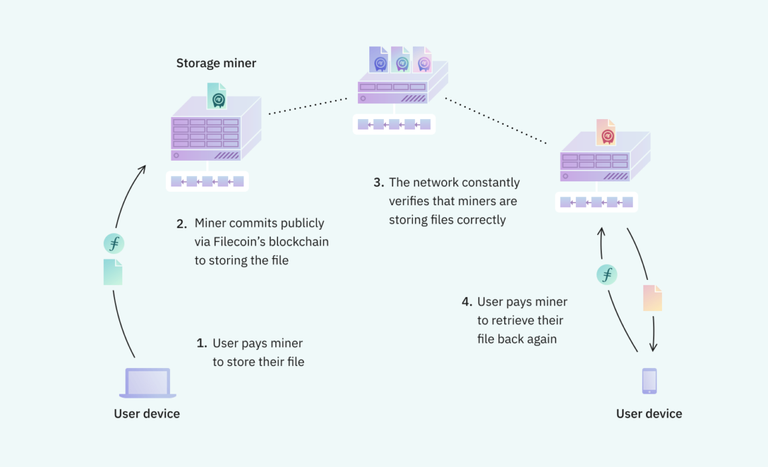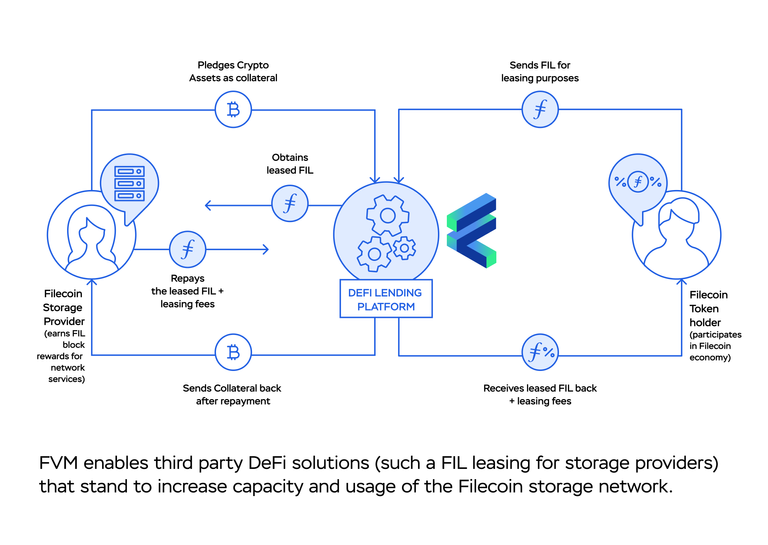

In our digital age, data storage has become a crucial aspect of our lives. Whether it's personal photos, important documents, or massive datasets, finding reliable and secure storage solutions is paramount. Enter Filecoin, a groundbreaking system that revolutionizes the way we store and retrieve digital data.
I spent around 5 days researching this new Decentralize Storage
In today's blog, we will explore the fascinating world of Filecoin, and also look at its core concepts in an engaging and accessible manner.
So Let's jump into the main topic ::
Decentralized Storage: The New Frontier
Filecoin introduces a concept called decentralized storage, which means that instead of relying on a single company or server to store our data, it leverages a vast network of computers distributed around the world. Imagine a vast web of interconnected devices working together to ensure the safety and accessibility of our precious files.

How It Works/The Basics ::
- Storage Providers and Users:
In the Filecoin network, there are two primary participants: storage providers and users. Storage providers are individuals or organizations that have spare storage capacity on their computers or servers. Users, on the other hand, are individuals or entities seeking storage space for their digital files.
- Supply and Demand:
Filecoin operates as a marketplace, connecting storage providers with users based on supply and demand. Users who need storage space for their files can browse through available providers and choose the one that suits their requirements. The providers, in turn, offer their unused storage capacity to users.
- Filecoin Tokens:
To facilitate transactions and incentivize participation, Filecoin has its native cryptocurrency called Filecoin tokens (FIL). These tokens serve as the currency within the Filecoin network. Users pay storage providers in Filecoin tokens for storing and retrieving their files.
- Storing Files:
When a user wants to store a file, they negotiate with a storage provider. They agree on the terms, such as the amount of storage space required and the duration of storage. The user then pays the agreed-upon amount in Filecoin tokens to the storage provider.
- Decentralized and Redundant Storage:
Instead of storing files in a single location, Filecoin employs a decentralized approach. The file is divided into smaller pieces and distributed across multiple storage providers in the network. This redundancy ensures that even if some storage providers go offline or experience issues, the file remains accessible from other copies stored elsewhere.
- Retrieving Files:
When a user wants to retrieve a stored file, they communicate with the storage providers to retrieve the necessary pieces. Filecoin ensures that the files are readily available by rewarding storage providers with Filecoin tokens for maintaining and making the files accessible.
- Incentives for Storage Providers:
Storage providers are motivated to participate in the Filecoin network because they earn Filecoin tokens for renting out their storage space. By utilizing their unused capacity, they not only contribute to the network's storage capacity but also gain a financial reward for their services.
- Trust and Security:
Filecoin utilizes blockchain technology to ensure trust and security within the network. The blockchain acts as a public ledger, recording and verifying transactions between users and storage providers. This transparency and immutability help prevent fraudulent activities and ensure that both parties fulfill their obligations.

Incentivizing Participation: Earn While You Store
One of the fascinating aspects of Filecoin is its unique approach to incentivizing participation, allowing individuals to earn while they store data. Let's explore how this incentivization model works in simpler terms.
In the Filecoin network, there are two key roles - storage providers and users. Storage providers are individuals or organizations that offer their unused storage space to store files, while users are individuals or entities who need storage for their digital data.
When a storage provider joins Filecoin, they allocate a portion of their storage capacity to offer to users. This can be extra space on their computer, server, or any other storage device they have available. By participating as a storage provider, they become an active contributor to the network.
Now, when a user wants to store their files, they interact with the Filecoin network and select a storage provider based on factors such as pricing, reputation, and availability. The user pays the storage provider a certain amount of Filecoin tokens (FIL) for the agreed storage duration.
Here's where the incentivization comes into play. Storage providers receive Filecoin tokens as compensation for renting out their storage space. The more storage capacity they contribute and the longer they maintain it, the more Filecoin tokens they earn. Essentially, they are rewarded for their participation and the resources they provide to the network.
This incentivization model benefits both storage providers and the Filecoin network as a whole. Storage providers have the opportunity to monetize their idle storage resources, turning them into a source of income. Meanwhile, the Filecoin network benefits from an increased storage capacity and robustness as more individuals and organizations are motivated to participate.
This approach also fosters competition among storage providers, driving them to offer competitive pricing and quality services to attract users. In turn, users benefit from a wide range of storage options, allowing them to select the most suitable provider based on their needs and preferences.
By creating a system where individuals can earn while they store, Filecoin encourages active participation and contributes to the growth and sustainability of the decentralized storage ecosystem. It empowers individuals to make the most of their resources and actively participate in the digital economy.

Security and Redundancy: The Power of Decentralization
Filecoin tackles the issue of security by using a technology called blockchain. This allows for a transparent and tamper-resistant record of transactions, ensuring that the storage providers fulfill their obligations. Moreover, your files are not stored in a single location but are distributed across multiple nodes in the network. This redundancy provides a layer of protection against data loss, ensuring that your files remain accessible even if some nodes go offline.

Proof-of-Replication and Proof-of-Spacetime: The Guardians of Trust
Filecoin employs two unique mechanisms to ensure the integrity and reliability of the stored data. First, the proof-of-replication confirms that the data is correctly replicated across multiple nodes. This prevents any malicious attempts to store fake or corrupted files. Second, the proof-of-spacetime verifies that the storage providers are consistently keeping the data available over a specified period. These mechanisms ensure that both parties in the storage transaction fulfill their responsibilities, promoting trust within the network.
Embracing the Future: A New Paradigm for Data Storage
Filecoin represents a new paradigm for data storage, ushering in a future where individuals and organizations can embrace decentralized and secure storage solutions. Let's explore how Filecoin is shaping the future of data storage in a simple and engaging manner.

- Empowering Individuals:
Filecoin puts the power of data storage back into the hands of individuals. In traditional storage models, we often rely on centralized providers who control our data. With Filecoin, individuals can choose where and how their data is stored. They have control and ownership over their files, ensuring privacy and reducing the risks associated with centralized data storage.
- Decentralized Storage:
Filecoin introduces the concept of decentralized storage, which means that data is distributed across a network of interconnected computers rather than being stored in a single location. This decentralization provides several advantages. Firstly, it enhances data security by reducing the risk of a single point of failure. Even if some storage providers go offline or encounter issues, copies of the data are still available from other nodes in the network. Secondly, it improves accessibility, as users can retrieve their files from multiple sources, ensuring uninterrupted access to their data.

- Trust and Transparency:
Filecoin leverages blockchain technology to ensure trust and transparency in the storage process. The blockchain acts as a tamper-resistant record of all transactions and interactions within the network. This transparency builds trust among participants as they can verify and audit the storage transactions. It eliminates the need for intermediaries and promotes a peer-to-peer relationship between storage providers and users.
- Redundancy and Reliability:
Filecoin's decentralized storage model introduces redundancy, which means that files are stored in multiple locations across the network. This redundancy provides a safety net against data loss. Even if some storage providers fail or data becomes corrupted, there are redundant copies available for retrieval. This enhances the overall reliability and durability of stored data, assuring users that their files are safe and accessible.
- Cost-Effectiveness:
Filecoin offers a cost-effective alternative to traditional storage solutions. By utilizing spare storage capacity from individuals and organizations, it optimizes the use of existing resources. Storage providers can monetize their idle storage, creating a more efficient and sustainable storage market. Users, in turn, benefit from competitive pricing as providers vie to attract customers with their offerings.
- Diverse Applications:
Filecoin's innovative approach to storage has far-reaching applications. It is suitable for personal users seeking secure storage for their files, businesses looking for scalable and reliable data storage, and even larger-scale applications such as archival storage, content distribution, and data-intensive research projects. Filecoin provides a versatile storage solution adaptable to various use cases and industries.

Filecoin Virtual Machine (FVM) Builder Cohort Launches to Mainnet ::
The launch of the Filecoin Virtual Machine (FVM) Builder Cohort on the mainnet marks a significant milestone in the development of the Filecoin ecosystem. The FVM Builder Cohort is an initiative designed to support developers in building and deploying decentralized applications (dApps) on the Filecoin network.
By providing a dedicated environment for developers to create and test their applications, the FVM Builder Cohort aims to foster innovation and expand the capabilities of the Filecoin ecosystem. It offers a range of resources, including tools, documentation, and technical support, to enable developers to leverage the power of the Filecoin network and unlock its full potential.
With the launch of the FVM Builder Cohort on the mainnet, developers now have the opportunity to deploy their dApps on a live and robust network. This allows them to gain real-world insights, refine their applications, and provide users with valuable services built on the Filecoin platform.

The Filecoin Virtual Machine provides a secure and scalable environment for executing smart contracts and running decentralized applications. It enables developers to utilize the full range of features offered by the Filecoin network, such as decentralized storage, incentivization mechanisms, and built-in security measures.
The launch of the FVM Builder Cohort on the mainnet signifies a significant step towards the broader adoption and utilization of Filecoin as a platform for decentralized applications. It opens up new possibilities for developers to create innovative solutions, ranging from data storage and content delivery to decentralized finance and beyond.
As the Filecoin ecosystem continues to grow and evolve, the FVM Builder Cohort will play a crucial role in supporting and nurturing the development community. By providing the necessary tools and resources, the initiative encourages developers to explore the potential of Filecoin, contribute to its ecosystem, and drive forward the decentralized web.

CONCLUSION
.gif)
Filecoin stands as a pioneering solution in the realm of decentralized data storage. With its innovative approach, it offers individuals and organizations a secure, reliable, and cost-effective means of storing and retrieving digital files. By leveraging the power of decentralization, blockchain technology, and incentivization, Filecoin creates a marketplace where users have control over their data and storage providers can monetize their unused capacity. This paradigm shift in data storage brings about a future where individuals can embrace the benefits of trust, transparency, and ownership in managing their digital assets. Filecoin represents a remarkable advancement that empowers users and revolutionizes the landscape of data storage in a plagiarism-free manner.

That's all for the day Guyz, I hope you enjoyed my blog.
You Guyz are awesome ☺️
Stay safe Be Cool 😎


Sources Of Information - LINK, LINK,LINK,
Posted Using LeoFinance Alpha





